- Home
- Ralph Peters
Cain at Gettysburg
Cain at Gettysburg Read online
The author and publisher have provided this e-book to you without Digital Rights Management software (DRM) applied so that you can enjoy reading it on your personal devices. This e-book is for your personal use only. You may not print or post this e-book, or make this e-book publicly available in any way. You may not copy, reproduce or upload this e-book, other than to read it on one of your personal devices.
Copyright infringement is against the law. If you believe the copy of this e-book you are reading infringes on the author’s copyright, please notify the publisher at: us.macmillanusa.com/piracy.
To my mother and father,
who drove us down to Gettysburg each year,
where my brother and I would clamber
over the cannon at the Angle;
restrain ourselves through a picnic lunch
(white-meat-of-chicken sandwiches)
eaten where gray waves slapped a wall of blue;
and always, always, always
visit the “Electric Map” with awed delight
Contents
Title
Dedication
Epigraph
I. The Ignorant Armies
Map of June 28, 1863: Lee Invades Pennsylvania
Chapter 1
Chapter 2
Chapter 3
Chapter 4
II. The Day of the Soldiers
Map of Afternoon, July 1st
Chapter 5
Chapter 6
Chapter 7
Chapter 8
Chapter 9
Chapter 10
III. The Day of the Generals
Map of Afternoon/Evening July 2nd
Chapter 11
Chapter 12
Chapter 13
Chapter 14
Chapter 15
Chapter 16
Chapter 17
IV. The Limits of Valor
Map of the Pickett-Pettigrew Charge, July 3rd
Chapter 18
Chapter 19
Chapter 20
Chapter 21
Chapter 22
Chapter 23
Chapter 24
Author’s Note
Forge Books by Ralph Peters
About the Author
Copyright
And he said, What hast thou done?
the voice of thy brother’s blood
crieth unto me from the ground.
—GENESIS 4:10
PART
I
THE IGNORANT ARMIES
ONE
June 28, 1863
Annoyed by flies, Meade fell asleep at last, only to wake with a hand upon his shoulder. The intruder’s lantern cast fantastic shadows. Hardie wore civilian clothes and crouched under the tent’s slant. It took Meade a moment to recognize him.
“What the devil?”
“I’m here to give you trouble,” the colonel said.
Blades of alarm pierced weariness. Meade sat up sharply.
“My conscience is clear,” he declared.
Margaret had warned him to check his temper. Now Hooker had charged him with insubordination, with Halleck’s acquiescence and bespectacled Hardie as henchman. He was being relieved of his command, arrested in the middle of a campaign. There would be a court-martial. Reputation’s assassin sneaking into camp, this colonel from the adjutant general’s office had come in the dark, in disguise. And he had always thought Hardie a decent fellow.
“I’ve done … nothing dishonorable,” Meade protested. “Nothing.” He yearned for coffee just off the fire, for the light of day, for a friend. “My differences with General Hooker … have been matters of professional judgment, nothing more.”
The colonel raised a hand to quiet him. The gesture struck Meade as insolent. Hardie grinned.
Black and devilish, flies looped around the lantern the colonel held. Settling the light on the camp desk, Hardie drew a pair of envelopes from a pocket.
“General Meade, you are ordered to assume command of the Army of the Potomac. Effective immediately, sir. I’m to accompany you to General Hooker’s headquarters, to witness the transfer of authority.”
Dumbfounded, Meade took the documents. He didn’t open them, but held the papers atop one knee. He wondered if arrest would not have been preferable. He began to wake fully and bitterly.
Outside, the camp clattered, despite the wretched hour. A sergeant barked and soldiers answered. Chains chimed and horses whinnied. Hardie’s arrival had yanked them all from sleep. His staff officers would be gathering by his tent, waiting to hear the news that had come from Washington.
How much had they guessed? Meade needed coffee. Coffee and John Reynolds. Reynolds was the man for this. Men followed him and loved him. Handsome John. He was the man to take command of the army. How foolish he himself had been to resent Reynolds’ advancement. He rued his pettiness now.
Meade sighed. He meant to rise and put on his uniform coat, to wrap his old bones in a guise of authority. But the flesh hesitated.
“I’m not qualified,” he told Hardie. “I’m the devil’s choice for this. I mustn’t command this army.”
“It’s the president’s decision.”
“What about Reynolds? Is it true he turned it down?”
Hardie shrugged. “I don’t believe there was a formal offer. Anyway, the president chose you, sir. General Halleck and Mr. Stanton concurred. They sent me to Frederick by special train. There’s no time to lose.”
Meade snapped, “Don’t you think I understand that?”
Halleck. The man was devoured by jealousy. Of Reynolds, that much was evident. Of Reynolds and so many others. Apparently, though, he wasn’t jealous of everyone. What does that say of me? Meade asked himself.
He did his best to button up his temper. His wife had warned him, more than once, that his tongue cut worse than his sword.
“I haven’t the seniority on the Army rolls,” Meade insisted. Then he added, “I thought things had been patched up with General Hooker?”
“Mr. Lincoln lost faith in him.”
So has the rest of this blasted army, Meade thought. Yet, removing Hooker now was madness. With battle looming. On a field yet unknown.
“Hardie, I don’t want this,” he said in a tamed voice. “I’m not the man for this.”
His visitor gestured toward the envelopes, which remained unopened. Meade unfolded the fateful order, bending to make out the words. Hardie took up the lantern again and brought it closer.
It was true. He had been selected as the latest general half-expected to fail and be damned forever.
Expected to fail? Was that the nub of it?
Meade tested each word of the order, then studied the accompanying correspondence from the general-in-chief. “Considering the circumstances,” Meade read, “no one has ever received a more important command.”
A sharp-fanged creature slithered through his bowels.
Had it come to this? With the Confederates already marching on Philadelphia, for all he knew? For all anyone knew? The evening before, he had worn himself out riding through the Maryland countryside trying to find Hooker, the man who held the string and hid both ends. The raw, hot roads had been burdened with batteries and commissary wagons, with regiments coming late to their camps and with stragglers, some of them drunk. No one knew where the army’s commander could be found.
“I don’t want this,” Meade said. “It’s impossible. I shall send a message to Halleck.”
Fixing his spectacles higher on his nose, Hardie said, “It won’t do any good, sir. The president’s mind is made up.” He set the lantern back down on the desk.
Meade arched his back. The camp bed creaked. “Does General Hooker know?”
“He sent in a letter of resignation.”
A quarter-smile cut into Hardie’s cheek. “I’m not sure he meant it to be accepted. But it was.” The smile turned cruel enough to tell Meade that Hooker had earned Hardie’s enmity. “I suspect he’ll know by the time we reach army headquarters.”
Meade snorted. “I don’t even know where that is.”
“I’ll guide you there, if you’ll loan me a horse. I came in a rented buggy.”
Irritated anew that he had failed to find Hooker’s camp the evening before, Meade asked, “Since you’re so well-informed, Hardie, would you happen to know where General Lee and his army are strolling just now? No one else seems to have any blasted idea. Certainly not this army’s corps commanders.”
The colonel shook his head. “General Hooker’s communications with Washington have been … limited.” Posture deformed by the slope of the canvas, he shed another layer of formality. “To tell you the truth, sir, he hasn’t told us much of anything. He wouldn’t even share his plan of campaign with Mr. Lincoln. All we heard from old Fighting Joe were calls for reinforcements and wails that the army’s outnumbered. He sounded more and more like Little Mac. It set the president out of temper. And that’s putting it soft.”
“Hardie, do you know where the corps of this army are right now?”
“Not all of them. It took some work to find you.”
The situation reminded Meade of a game he had seen blindfolded children play in Tampico. Spun round, they lashed out with a stick, trying to shatter a dangling plaster animal filled with treats. Except that there would be no treats this time. Only the blind lashing out.
Meade reached for his watch. Instead of metal, his hand met the sweat-heavy cloth of an undergarment. Wake up, he commanded himself. Take hold of yourself. “What time is it, Hardie?”
The colonel drew out his watch and clicked open the cover. “Half past three, sir.”
“Well, we’ll have a ride before us. If we must go through with this.” He cleared his throat, tasting bile. “I’d like a few moments alone. And you’ll want your breakfast.”
“Yes, sir.” The colonel turned to go.
“Hardie?”
Hand on the tent’s flap, the visitor turned again. Reflections of the lantern’s flame flickered on his spectacles.
“I’ve been tried and condemned without a hearing, and I suppose I shall have to go to execution,” Meade said. He attempted a smile and failed. “Send Captain Meade to me. And tell my staff I’ll join them shortly.”
“Shall I let them know, sir? About the order?”
Meade brushed a fly from his beard. “Do as you see fit.”
Left alone, Meade clutched the paper that damned him. His bowels winced again. The flesh always reminded a man of the constraints on human dignity.
In those last private moments, he thought about young George. It had wounded Meade when the boy was cast from West Point for his follies. Now he himself had been pointed toward failure, toward a far greater failure, a failure that would resound for generations. Was it a curse on the family? His father, too, had failed, in a different way, in a different world.
Still waking to the charge that had been given him, Meade felt a wave of shame, as if one of those Barnegat rip currents had changed the direction of an inner sea. He needed to control himself, if he hoped to control the army. To put up a manly show. How could he have indulged in such fretting in front of Hardie? How could he have shown such weakness? Weariness was no excuse, nor was confusion.
He imagined the colonel telling tales at the bar in Willard’s Hotel. He could hear the laughter of clerks and politicians.
Well, the thing was done.
In the sour air of his tent, Meade viewed himself with an engineer’s cold eye: too dark of thought, too dour, a man alert to the smell of sulfur, but not to Heaven’s scent. He could hear Margaret teasing, “George, I know you can smile!” His wife was a proud, loyal woman, of good family. She had got him a brigadier’s rank at the start of the war, when his merits had not sufficed. He would have to do his best for her. And for the Union, of course.
Major General George Gordon Meade had been happiest building lighthouses.
* * *
At the cue of hoofbeats, General Hooker emerged theatrically from his tent. Stepping into the humid dawn in his full dress uniform, he looked a perfect military specimen. Only his gold-trimmed hat was missing, left behind to exhibit his fine shock of hair. Flanked by his staff, the dismissed commanding general posed for a martial portrait. Meade stilled his horse and dismounted, slopped with sweat and more than a little mud.
Accompanied only by his son and Hardie, Meade hardly felt apt to complete Hooker’s tableau. An officer once had remarked within his hearing that “Old Meade resembles a bishop who’s sucked a lemon.” He had mastered a steely dignity, but knew he would never be a favorite of crowds.
Hooker extended his hand. Meade wiped his own on a trouser leg, then took it.
“You’ve got the bag of wildcats now,” Hooker told him. “And I wish you luck.” He released Meade’s hand. Anxious to catch each word, Hooker’s coterie edged closer.
“General Hooker,” Hardie interposed, “we need to—”
“A moment, Hardie, a moment. You needn’t be so impatient for my head.” Piercing eyes unclouded by drink this day, Hooker returned his attention to his successor. “I’ve already published my farewell order, so we can abridge the formalities.” He smiled wryly. “We wouldn’t want to inconvenience Colonel Hardie by delaying his return to Washington. Butterfield has a copy of it for you. You won’t find it objectionable.” He patted Meade on the upper arm, in a show of amity neither man could feel. There had been too much bad blood before this day. “Shall we go to the headquarters tent?”
Meade knew he would have to clear out the worst of Hooker’s men, but it couldn’t be done all at once, not in midcampaign. He would have to live with the ill will and the spies alert for missteps. He would have liked, at the least, to remove Butterfield, who was Hooker’s given creature through and through. But Warren had refused the chief of staff’s position, preferring to remain chief engineer and telling Meade he’d be mad to get rid of the only man who might know what Hooker had been up to with the army. Meade took the point, but suspected Warren of avoiding the prospect of failure at his side.
Who would stand by him? John Reynolds, of course. Despite some petty bickering in the past, he knew he could count Reynolds as a friend. But he needed Reynolds in the field, in command, not at headquarters. Gallant John. Their spats aside, he and Reynolds understood each other. Lancaster and Philadelphia, two Pennsylvania men. Perhaps it was as simple as that. He had sent off a courier even before riding out of the Fifth Corps camp, asking Reynolds to come to army headquarters.
The labor of transferring command began. With a map of Maryland spread over a borrowed farmhouse table, Butterfield reeled off the approximate—very approximate—locations of the various corps of the Army of the Potomac. Fiddling with his mustaches as he spoke, the chief of staff kept glancing from Meade to Hooker.
Meade was appalled that the army remained so dispersed, an invitation to defeat in detail and a gift to Robert E. Lee. But he said nothing. He would give his orders soon enough. First, he needed to listen. Nor did he wish to humiliate Hooker further in front of his acolytes. Bad blood enough already, bad blood enough.
Hooker, too, remained silent.
Colonel Sharpe of the Bureau of Military Information took his turn. He had not prepared a map.
“It’s been confirmed that General Ewell … in command of Jackson’s old corps, somewhat reduced … has passed a division through York. One brigade reached Wrightsville on the Susquehanna, but the militia burned the bridge before the enemy could cross.”
The colonel paused to look at Meade, as if expecting a question.
“Go on, Sharpe,” Meade said. “Where’s Ewell now?”
“Carlisle, we believe. Threatening Harrisburg, according to General Crouch and Governor Curtin’s people.”
Hooker
leaned forward. He was a man who loved to speak and could resist no longer. “Bobby Lee isn’t interested in Harrisburg. He’s attempting to lure this army into a trap. I’ve done my best to stay out of it.”
“Where’s Lee now?” Meade asked.
Sharpe lifted his eyebrows and whisked the air with a hand. “It’s unclear, sir. Somewhere north of Hagerstown and still west of the mountains. No doubt, he intends to reunite with Ewell.”
“Longstreet?”
“He’ll be with Lee, sir. Now that Jackson’s gone.”
“And Hill?”
“We don’t know, sir. Probably west of the mountains.”
“Is that your answer to everything, Sharpe? ‘West of the mountains’?” Meade turned to Hooker. “What were your orders to the cavalry?”
Butterfield answered for his former superior. “They’re conducting a screen on a broad front, covering our flanks and the passes on our left, up to the Pennsylvania line. To prevent surprise.”
Chancellorsville leapt to every mind. No one dared say the name in front of Hooker.
“And General Stuart?”
“We’ve lost contact with him. Since the affair at Upperville.”
“I want to see Pleasanton,” Meade said. “Today.”
A staff man in a cavalry jacket exited the tent. Meade cautioned himself again. Occasional flashes of anger enlivened subordinates, but constant anger demoralized them. Still, he couldn’t but feel outraged at finding the army spread halfway to China. And Lee on a romp through Pennsylvania, awaiting his chance to strike.
When he reached for his watch this time, Meade found it. “Gentlemen,” he said, “I’m obliged to send a message to General Halleck.” He turned to the man he had replaced. “General Hooker, I beg your indulgence.” Addressing the little group again, Meade continued, “I have twenty-five minutes past six. Let us reconvene in one hour. General Butterfield, is there a place where I can write without interruption?”
And write Meade did. He knew Halleck’s temperament and the backbiting in the War Department well enough to make himself two pledges. First, he would see that each message from his headquarters would be as clear as the English language could make it, even if he had to write every last one himself. Second, he would keep Halleck so well-informed that he’d have no excuse for meddling. He was not going to make Hooker’s mistake. At least, not that one.

 Darkness at Chancellorsville
Darkness at Chancellorsville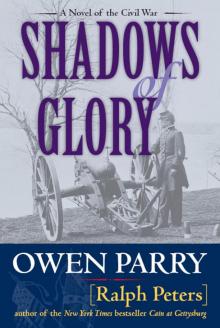 Shadows of Glory
Shadows of Glory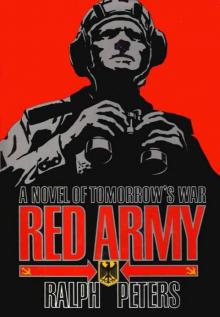 Red Army
Red Army Cain at Gettysburg
Cain at Gettysburg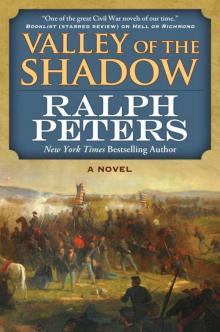 Valley of the Shadow: A Novel
Valley of the Shadow: A Novel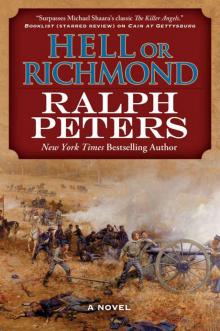 Hell or Richmond
Hell or Richmond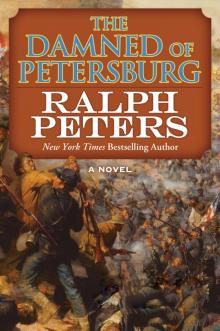 The Damned of Petersburg
The Damned of Petersburg The War After Armageddon
The War After Armageddon The War in 2020
The War in 2020